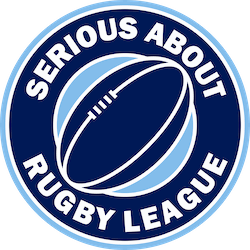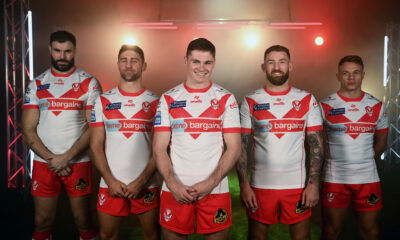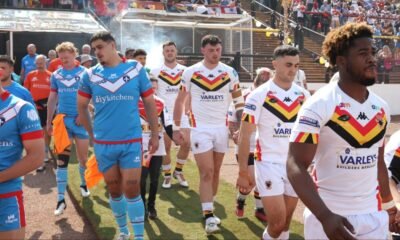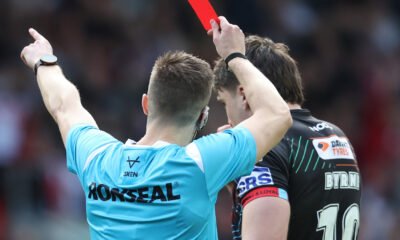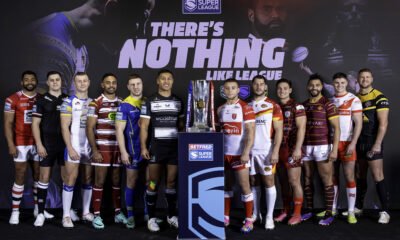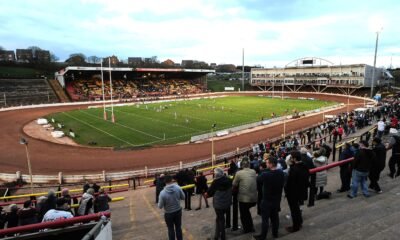
Salford Red Devils are the only team in Super League with part ownership from the fans. Whilst protests currently surround the ownership of Manchester United, especially with the recent bid withdrawal of Sheikh Jassim, a few miles down the road at the AJ Bell Stadium another team in red has a different idea about club ownership – but is it working and are the fans getting out if it what they were promised?
Earlier this year Salford Red Devils made history by announcing, the launch of ‘Reds Rise Together’; a community share offer scheme that will see the club transition into the first Super League club in the northern hemisphere to be community owned.
The club has been run by a consortium of fans since they completed a takeover from Marwan Koukash in 2018. The deal saw ownership pass to a consortium of long-standing supporters of the club: Andrew Rosler, owner of Ideal Corporate Solutions Limited, Asif Latief, marketing director at A-Plant, Hannah Fendall, senior associate at Williamson & Croft LLP, and Dawn Fidler, founder and CEO of The Joshua Wilson Brain Tumour Charity.
Mr Koukash, a Palestine-born racehorse owner, rescued the club from potential collapse in 2013 and became an outspoken figure within Rugby League.
The Red Devils have a strong Rugby League tradition. They were founded in 1873 making this year their 150th anniversary. During this time, Salford has won six championships and one Challenge Cup and experienced many highs and lows in terms of ownership.
In 2012, the Reds made a statement move to the AJ Bell Stadium, sharing the stadium with Rugby Union giants, Sale Sharks. However, will the new fan ownership scheme resurrect the club or is it a desperate effort to stave off financial ruin?
The purpose of ‘Reds Rise Together’ is to allow fans to purchase a share in the club’s holding company, Community Benefit Society (CBS). Once a fan purchases a share in the club, they will be eligible to stand for election to the CBS board and have a genuine say in how their club is run. In 2023 alone, over £300,000 has been raised by the scheme.
Paul King, (the Managing Director) said, “this year we’re celebrating 150 years of a club at the heart of its community. Now we’re growing that community, as well as placing it at the heart of the club.” King goes further to claim that “by doing this, it allows us to maintain a competitive playing squad and gives us a real chance to win the biggest prizes in the game.”
But the events of the last week have done nothing to fill the fans with belief that these promises will be followed up on. In fact, the trust from many may have now been completely lost with the sudden departure of arguably the club’s two best players, Brodie Croft and Andy Ackers, to Super League rivals Leeds Rhinos.
One of the Reds’ biggest problems in the past was selling their best players whenever they were close to achieving something big. This seems to be a case of history repeating itself.
Croft is a hugely talented half-back at the peak of his career, yet he only completed one year of an eight-year contract he signed earlier this season – a deal which now looks like a smokescreen to get more fans invested into the club. This raises important questions about Salford’s ambition, financial position and their future.
Salford are one of the lowest spenders in the Super League and so far, the Reds have only signed Nene MacDonald from the Rhinos for 2024. This year, the club finished a disappointing seventh, narrowly missing out on a Play-off position, despite a great start to the season. It looks like Salford will go into next season weaker rather than stronger and this will test the strength of their fan ownership scheme, with trust starting to diminish and attendance numbers, currently at an average of 5,121, to be tested further.
In practice, the Red Devils must now deliver in the transfer market and on the pitch if the idea of fan ownership is to spread any further in Super League. Fan ownership can bring many benefits to the club and its community – fans can invest in the team that they love and have a direct say in how it is run, and the scheme could give a club stability and greater protection during times of financial crisis. But there is a feeling that the full picture is missing at Salford, with a lack of clarity on finances and the club’s future.
Community involvement is a huge strength of Rugby League and fans can have an even closer connection with a club that they collectively own. The big question is whether Salford has a large enough fan base to create the revenue it needs to be a success in the future. Giving fans ownership will take a while to have an impact and Super League is a highly competitive environment.
Many clubs and their supporters will look at Salford in the next few seasons to see if there are any improvements, in terms of strength of squad, progression in the league and attendances. Time will tell whether this dream will become reality, but the early signs are not hopeful for the Red Devils.
